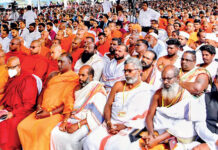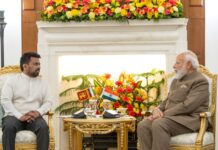Man’s Need for Akhira
Mankind, in its history of several millenniums, has now reached the epoch of Doomsday Preppers. These preppers are survivalists of a very narrow scope, often ridiculed for their silly approach to survive economic collapse, nuclear wars, societal collapse by escaping into bunkers that they have built in their backyards or estates, with survival kits. As it has become a lucrative commercial enterprise, consultancy firms have mushroomed in many Western capitals to facilitate customers for doomsday lifestyles. Although the name is related to a National Geographic documentary series of 2011, preparing for doomsday scenario and expecting end of the world are instinctually found in human nature. We often hear weird stories of doomsday cults. All such thoughts are associated with this human nature.
Man flees from danger for his own protection; his survival instinct turns him to pure selfishness. The Qur’anic description of man’s survival instinct is matchless by any standard. Its absolute manifestation can be visible on the day the trumpet is blown. On that day each one will be oblivious of all save himself; he will flee from his mother, father, brother, consort, children and everyone on earth; the suckling woman shall utterly neglect the infant she suckles and the pregnant woman will cast her foetus out.
Eschatologists, the people who specialize in the science of end times and life after death, knowing its fundamental importance for human existence, have kept the subject alive throughout history. As man’s desire for a life after death cannot be dissected from his nature, eschatology becomes essential to answer the many questions that arises in his mind about worldly life.
Al Habib
As the belief in the life after death forms a fundamental aspect of Islamic faith, we find a vast array of sayings of the Prophet (PBUH) in the Hadith books on this subject. The knowledge of the Hour is exclusively held by Allah SWT and it is hidden from the perceptions of all His creations. However, man can perceive its nearness through the signs of the Hour that are found in various Hadith. There are minor as well as major signs.
This is where Al Habib’s extraordinary role becomes significant. It is not the role of an eschatologist in the narrow sense of the term, but of a Mujtahid and Imam who presented to the Ummah a whole new jurisprudence, The Jurisprudence of Transformations. Allama Al Habib Abubakr Al Mashhur returned to the presence of his endlessly merciful Lord on the 27th July 2022, leaving us in the fleeting abode of the Dunya. On that day the Ummah lost one of its greatest spiritual educators of the era and a determined upholder of the Tasawwuf tradition. My interest in the Yemeni-born Sheikh of Qadiriya spiritual order grew after listening to a series of lectures he delivered on the subject of The Jurisprudence of Transformations – Fiqh Attahawwulaat – فقه التحولات. His thesis was constructed on the basis of a Prophetic saying, came to be known popularly as the Hadith of Jibreel. He invited the Muslims to see social and cultural developments of the modern world from the prism of this jurisprudence and continuously argued with solid proof that each and every major transformation that human civilization passes through was foretold by the Prophet, thus divinely ordained; and that when man understands them contextually in the right perspective, life becomes easier and free of confusion for him.
One of the most striking examples he quotes is the episode related to Hasan Bin Ali (R A), the grandson of the Prophet (PBUH), how he successfully handled the crisis of rulership with prudence and farsightedness. Hasan (R A) was aware of a Hadith in which the Prophet (PBUH) foretold about the end of Khilafah on the Prophetic method and the beginning of hereditary rule. When the issue of ownership to Khilafah arose and Muslim Ummah was in a decisive juncture during the reign of Muawiya Bin Abi Sufiyan (R A), Hasan (R A), realising that the time for the transformation of Khilafah to hereditary rule has arrived and, although he had a rightful claim to the Khilafah, ceded the Khilafah to Muawiya (R A), albeit on condition that he rules according to the rules of the Qur’an and Sunnah. Hence, Al Habib argued that it was the contextual understanding of the Hadith that led Hasan (R A) to avert a catastrophe and act according to will of Allah.
His Methodology
Al Habib (Rahimahullah) emphasised the centrality of this Fiqh and termed it as the fourth pillar of our religion, followed by Islam, Iman and Ihsan (Excellence). He dedicated a fair portion of latter part of his life to promote the jurisprudence of transformation through popular talk-shows, writings and lecture-tours, with special reference to the younger generation of Muslims. His primary focus is the training of human soul and building of exalted moral character. He envisioned a disciplined Muslim imbued with Adab(politeness and respectability), which has been lost in the society.
His Da’wah approach is built on the following important four premises:
• Reviving the methodology of peace – non-confrontational interaction with any group or individual who identify with Islam. He strictly abhorred argumentation with Muslim groups of opposing views,
• Fiqh of transformations – protecting the younger generation from despair arising out of tribulations (Fitna) that the Muslims and the world in general go through; cultivating hope about life and the art of contextual decision making,
• Reviving the Da’wah methodology of Tasawwuf tradition – it is incumbent upon the Ummah to protect and nurture this rich treasure of Islam. He was bold enough to call upon a section of the Muslim Ummah to shun what is called superstitions and innovations in the name of religion,
• Establishment of institutions – Allah SWT blessed him with the honour of founding over a hundred academic institutions and learning centres in Yemen and other places for the purpose of producing a younger generation premised on his methodology; to his credit, hundreds of thousands of disciples with peaceful mind and sound intellect have been produced across the Muslim world.
Finally, as the death of scholars and pious leaders do not bode well for the Ummah, the Prophet (PBUH) cautioned the Muslims as follows:
“Verily, Allah does not withhold knowledge by snatching it away from his servants, but rather he withholds knowledge by taking the souls of scholars, until no scholar remains and people follow ignorant leaders. They are asked and they issue judgments without knowledge. Thus, they are astray and lead others astray”, (Ṣaḥīḥ al-Bukhārī & Ṣaḥīḥ Muslim).
Reading this Hadith in the context of Fiqh of Transformations, such a danger and intellectual calamity can be effectively averted only by taking meaningful initiatives to produce younger generations of scholars and Da’ees who are imbued with sound knowledge and noble characters; by producing thousands of pious servants as Al Habib.
Mohammed Asim Alavi
Writer and Educational Consultant, Sri Lanka
Email: asimalav@yahoo.com



